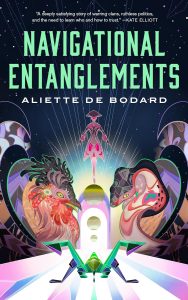Liz Bourke Reviews Navigational Entanglements by Aliette de Bodard
 Navigational Entanglements, Aliette de Bodard (Tordotcom 978-1-25032-488-7, $20.99, 176pp, hc) July 2024.
Navigational Entanglements, Aliette de Bodard (Tordotcom 978-1-25032-488-7, $20.99, 176pp, hc) July 2024.
With Navigational Entanglements, Aliette de Bodard flexes her space opera muscles in a slightly different direction, in a universe that draws as much on the ‘‘cultivation fantasy’’ of xiānxiá as on the atmosphere and aesthetics that underpin her Xuya universe novels. Navigational Entanglements opens new vistas in a world where space travel is accomplished through the skills and talents of the five navigator clans.
Rooster, Ox, Snake, and Rat clans maintain their traditional independence from the empire that otherwise rules their region, using the power of their carefully trained and cultivated Shadows to open navigation gates to the Hollows, the space beyond the stars where faster-than-light travel is possible, and guide their vessels through that space to the end of their journey. The Dog clan, much derided by the others, has chosen a different path as imperial officials and enforcers.
The Hollows have their own dangers. In the wake of a ship crash, one of those dangers has escaped from the Hollows into ordinary space. A tangler is a creature akin to a huge jellyfish, visible only to those people who’ve trained their Shadows, whose long, trailing tendrils feed on cognition, making its prey gradually lose control over their own thoughts and their own bodies before death finally claims them.
Việt Nhi, the first of Navigational Entanglements’ two viewpoint characters, isn’t very good with people, though she’s frequently very good at understanding their secrets. And she doesn’t like politics. This poses a problem, because she’s a junior Rooster disciple and she’s just been assigned to the interclan team sent to track down and trap the tangler: a team composed of her fellow junior disciples and led by the insufferable Dog clan official Ly Châu.
Nhi is decidedly unhappy about it: ‘‘And worse, it had people. Not just any people: Nhi was going to have to put up with her peers.’’
Those peers include Båo Duy of the Rat clan, who has a past history of scientific overenthusiasm and tangler-related experiments; Lành of the Ox clan, sole survivor of a tangler encounter in her early childhood, bitter and abrasive; and Hạc Cúc, one of the Snake clan’s assassins, insecure about ever living up to her mentor’s unmatchable honourable example, who gets on with Lành about as well as a house on fire: which is to say, disastrously badly.
This mismatched selection of clashing personalities is an odd – and a bad – choice for dealing with a serious incident. But despite the circumstances, Nhi finds herself drawn to Hạc Cúc, and Hạc Cúc, the second viewpoint character, in turn finds herself drawn to Nhi’s odd combination of startling perceptiveness and simultaneous obliviousness to social convention. It seems just barely possible that this team might succeed in their task without outright murdering each other, provided that nothing goes too badly wrong.
Unfortunately, then Ly Châu turns up dead in a locked room, poisoned. Who killed her? And why? The tangler itself remains a more pressing issue, for Ly Châu’s corpse shows evidence of her having been exposed to its tendrils. And when the surviving members of the team uncover where she went, it turns out that the tangler is there. And huge. And reproducing thousands of tiny tanglers.
The tangler was released by the elders of the four nonimperial clans themselves, to create a disaster and make a political statement over how much the empire still needs them and their independence. Wounded by their elders’ betrayal, both Việt Nhi and Hạc Cúc have to wrestle with their own individual insecurities and moral courage to decide what each of them will do in the face of the horror their authority figures are prepared to inflict to score political points. And whether or not their choices will bring them together or drive them apart.
This is a fast, tense story that drives atmospherically forward towards its confrontations and revelations. The jellyfish-like tangler is legitimately unnerving: The scenes where Việt Nhi and Hạc Cúc are attempting to restrain it and rescue the other two junior disciples are decidedly gripping. And the push and pull between the two viewpoint characters, able to see each other more clearly than they see themselves, moving from irritation to attraction – and at times retreating sharply from the vulnerability of such a thing – as they’re forced to cooperate in the face of problems that escalate from the trivial (Ly Châu being a petty tyrant) to the catastrophic (the tangler, loosed on a major population centre, could claim a death toll in the hundreds of thousands at least) is solidly compelling.
Like much of de Bodard’s work, it’s very interested in moral courage, in the consequences of being betrayed or let down by authority figures who were supposed to be trustworthy, or at least somewhat worthy of their moral and practical authority; and like much of her work it concerns itself with main characters who are in some sense outsiders, who have or who feel themselves to have a marginal position with regard to their societies, whose sense of safety and belonging has always been contingent. Navigational Entanglements undergirds itself with a powerful sense of justice, as well as compassion – even for the tangler.
I loved it. Give me more, please.
Liz Bourke is a cranky queer person who reads books. She holds a Ph.D in Classics from Trinity College, Dublin. Her first book, Sleeping With Monsters, a collection of reviews and criticism, is out now from Aqueduct Press. Find her at her blog, her Patreon, or Twitter. She supports the work of the Irish Refugee Council and the Abortion Rights Campaign.
This review and more like it in the April 2024 issue of Locus.
 While you are here, please take a moment to support Locus with a one-time or recurring donation. We rely on reader donations to keep the magazine and site going, and would like to keep the site paywall free, but WE NEED YOUR FINANCIAL SUPPORT to continue quality coverage of the science fiction and fantasy field.
While you are here, please take a moment to support Locus with a one-time or recurring donation. We rely on reader donations to keep the magazine and site going, and would like to keep the site paywall free, but WE NEED YOUR FINANCIAL SUPPORT to continue quality coverage of the science fiction and fantasy field.
©Locus Magazine. Copyrighted material may not be republished without permission of LSFF.







